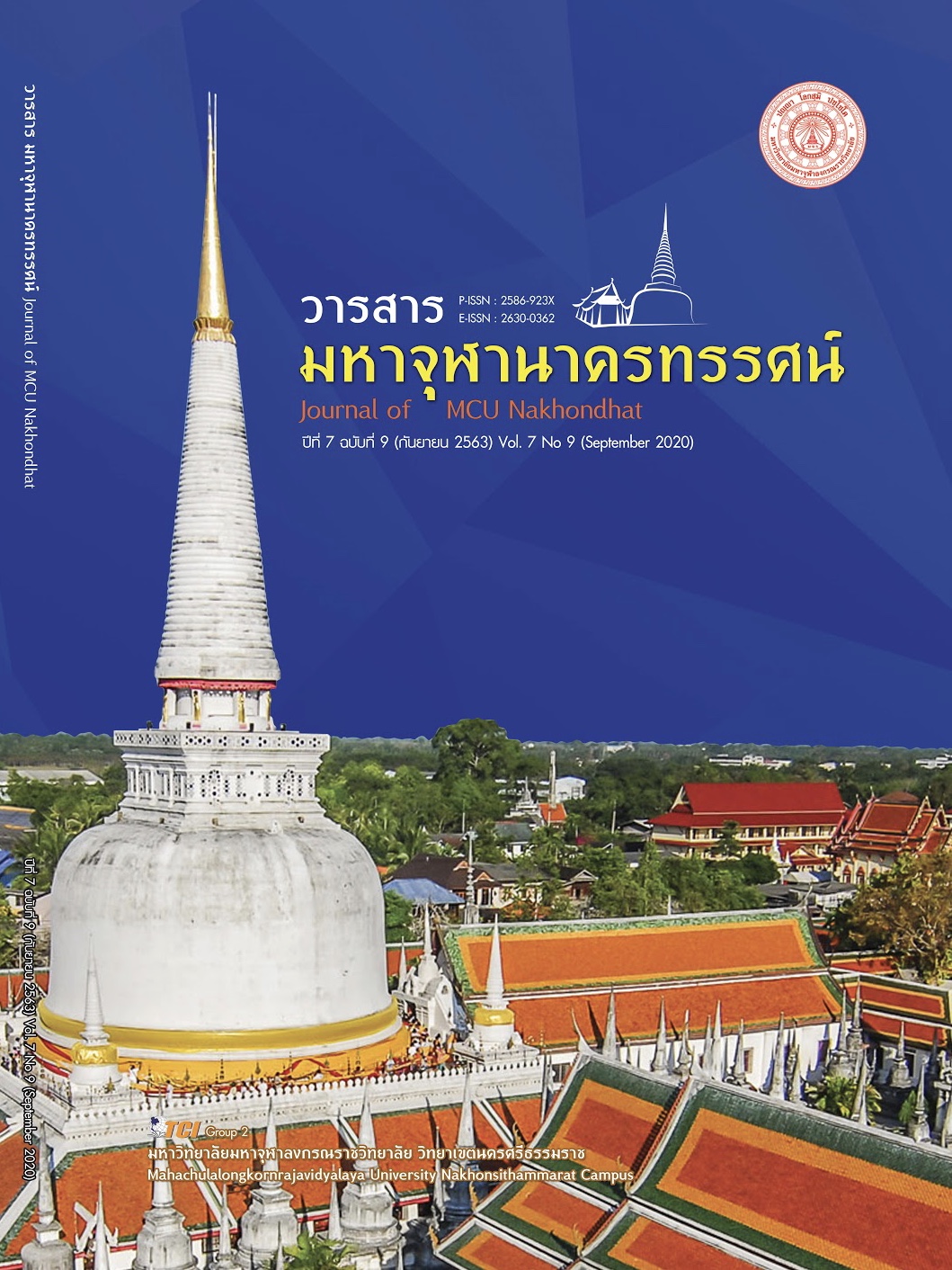DEVELOPMENT OF PROBLEM – SOLVING ABILITY IN MATHEMATICAL FOR MATHAYOMSUKSA 4, USING INQUIRY BASED LEARNING AND COOPERATIVE PROBLEM SOLVING LEARNING PACKAGE PROBABILITY
Main Article Content
Abstract
This research of the action research approach. The purpose of the study was to improve mathematical problem – solving skills of grade – 10 students using inquiry – based learning and cooperative problem – solving learning package so that the students gained a learning achievement mean score in the topic of probability of 70% of the total score. The sample group consisted of 18 grade – 10 students from classroom no. 4/2, semester 2/2020, Phadung Naree School, Muang district, Maha Sarakham; they were selected through purposive sampling using a mathematical problem – solving test as a sampling unit. The instruments used in the study included 1) 3 sets of a 4 – choice mathematical problem – solving test, 2) a mathematical problem – solving behavior observation form and 3) 10 lesson plans on probability. The collected data were analyzed using arithmetic mean, standard deviation, and percentage. Findings: After implementing inquiry – based learning and using the cooperative problem – solving learning package, in the first spiral, some of the students displayed a lack of basic knowledge required to perform learning activities; the mean score was 62.04%. In the second spiral, students were accustomed to the learning approach, however, they were imprudent and did not pay attention to the activities; the mean score was 68.06%. Lastly, in the third spiral, students were more accustomed to the learning approach and paid more attention to the activities; the mean score was 78.47% which passed the criteria set of 70% from the total score.
Article Details
References
ธัญญา แนวดง. (2561). ผลการจัดการเรียนรู้แบบอุปนัยร่วมกับเทคนิค Think – Pair – Share ที่มีต่อมโนทัศน์และความสามารถในการให้เหตุผลทางคณิตศาสตร์. วารสารมนุษยศาสตร์และสังคมศาสตร์ มหาวิทยาลัยราชภัฏสุรินทร์, 20(1), 29-41.
พิมณิชา ทวีบท. (2560). การพัฒนาสมรรถนะการแก้ปัญหาแบบร่วมมือของนักเรียนห้องเรียนพิเศษวิทยาศาสตร์ เรื่อง ปริมาณสารสัมพันธ์โดยการจัดการเรียนรู้ด้วยรูปแบบการแก้ปัญหาอย่างสร้างสรรค์. ใน การประชุมวิชาการระดับชาติ นเรศวรวิจัย ครั้งที่ 13: วิจัยและนวัตกรรม ขับเคลื่อนเศรษฐกิจและสังคม, พิษณุโลก: มหาวิทยาลัยนเรศวร
สถาบันส่งเสริมการสอนวิทยาศาสตร์และเทคโนโลยี. (2546). การจัดการเรียนรู้กลุ่มวิทยาศาสตร์ หลักสูตรการศึกษาขั้นพื้นฐาน. กรุงเทพมหานคร: สถาบันส่งเสริมการสอนวิทยาศาสตร์และเทคโนโลยี.
สถาบันส่งเสริมการสอนวิทยาศาสตร์และเทคโนโลยี. (2551). ทักษะ/กระบวนการทางคณิตศาสตร์มืออาชีพ. (พิมพ์ครั้งที่ 2). กรุงเทพมหานคร: ส.เจริญการพิมพ์.
. (2560). ทักษะ/กระบวนการทางคณิตศาสตร์ (พิมพ์ครั้งที่ 2). กรุงเทพมหานคร: ส.เจริญการพิมพ์.
สิริพร ทิพย์คง. (2545). การแก้ปัญหาคณิตศาสตร์. กรุงเทพมหานคร: คุรุสภาลาดพร้าว.
. (2559). การศึกษาผลสัมฤทธิ์ทางการเรียนคณิตศาสตร์และความสามารถในการแก้ปัญหาทางคณิตศาสตร์ ของนักเรียนชั้นมัธยมศึกษาปีที่ 2 เรื่อง การประยุกต์ของสมการเชิงเส้นตัวแปรเดียวโดยการใช้เทคนิค KWDL โรงเรียนทุ่งศรีอุดม จังหวัดอุบลราชธานี. วารสารศึกษาศาสตร์ปริทัศน์, 31(1), 74-84.
องอาจ นัยพัฒน์. (2548). วิธีวิทยาการวิจัยเชิงปริมาณและเชิงคณภาพทางพฤติกรรมศาสตร์และสังคมศาสตร์. กรุงเทพมหานคร: สามลดา.
อัมพร ม้าคนอง. (2554). ทักษะและกระบวนการทางคณิตศาสตร์: การพัฒนาเพื่อพัฒนาการ. (พิมพ์ครั้งที่ 2). กรุงเทพมหานคร: จุฬาลงกรณ์มหาวิทยาลัย.
National Council of Teachers of Mathematics (NCTM). (1991). Professional and Standards for Teaching Mathematics. Reston Virginia: The National Council of Teachers of Mathematics.


